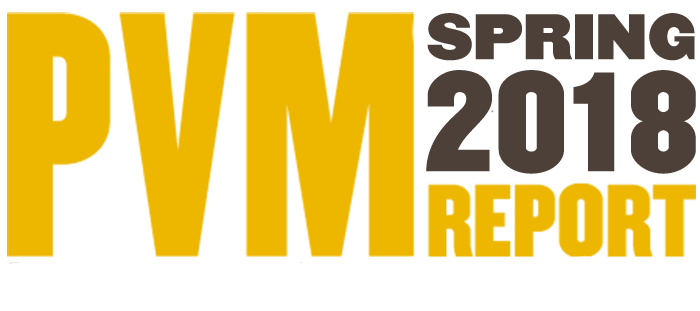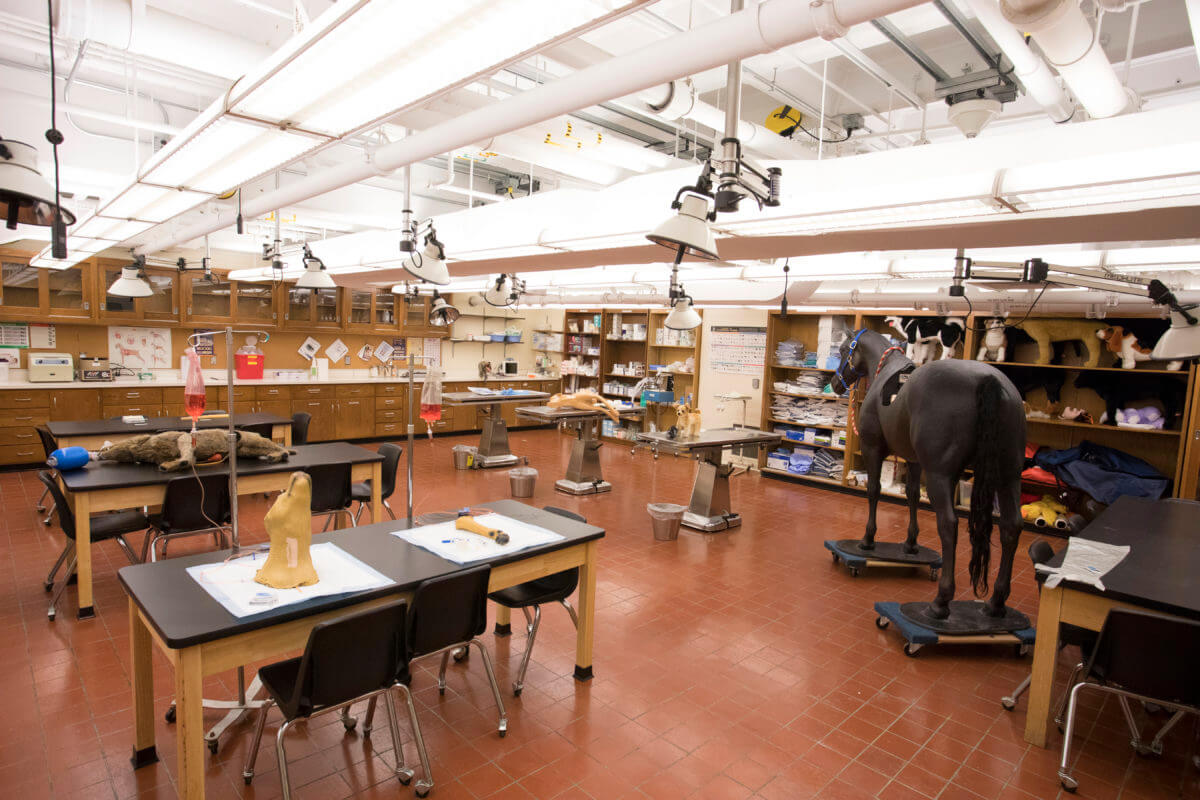 The Clinical Skills Laboratory was created as part of the new curriculum. In this lab, students in the first three years of the DVM Program have the opportunity to practice skills so that they can truly achieve competency.
The Clinical Skills Laboratory was created as part of the new curriculum. In this lab, students in the first three years of the DVM Program have the opportunity to practice skills so that they can truly achieve competency.
The Purdue University College of Veterinary Medicine is launching a new curriculum for the first three years of the DVM Program with the goal of graduating veterinary students who are practice-ready and have the foundation to pursue any veterinary career path. Approved by the faculty this spring, the new curriculum begins in the fall with the incoming Class of 2022.
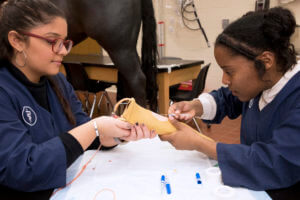
Purdue veterinary students Rachaell Miranda (left) assists Zhané Brown as she practices placing an intravenous catheter in a canine leg model in the Clinical Skills Laboratory in Lynn Hall.
“This curriculum will provide a strong foundation in the major domestic species and allow students to tailor their curriculum to their future career goals,” said Dr. Kathy Salisbury, PVM associate dean for academic affairs and professor of small animal surgery. Development of the new curriculum spanned several years and involved numerous members of the College’s faculty and staff. “We are excited to launch this new course of study for our DVM students, which is designed to improve their non-technical competencies, such as communication and business skills, and expand their training in primary care so they will be more prepared to enter the clinical setting and will be equipped to confidently enter the workforce at graduation,” Dr. Salisbury said.
The core curriculum has been expanded for all students regardless of their career focus. The first two years remain concentrated on basic sciences while the third year focuses on the clinical sciences. Year one examines the normal animal with courses such as anatomy, physiology, microscopic anatomy, immunology, behavior and nutrition. A course on animal production systems and associated ethical issues will provide all students with an understanding of production systems so that even small animal veterinarians can discuss these topics knowledgeably. Additionally, in order to increase their intercultural competency, first-year students will complete a co-curricular requirement consisting of the online modules in the diversity and inclusion certificate program that is offered by the College through the Center of Excellence for Diversity and Inclusion in Veterinary Medicine.
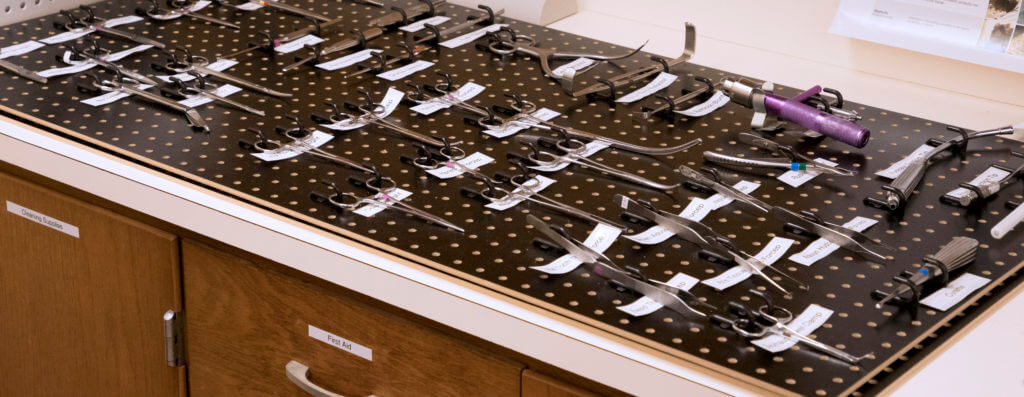
An instrument board in the Clinical Skills Lab displays many commonly used surgical instruments so the students can become familiar with their identity as well as how they function.
The second year focuses on the response of the body to injury and disease with courses such as pathology, bacteriology, virology, parasitology and pharmacology. Veterinary epidemiology and public health are also covered.
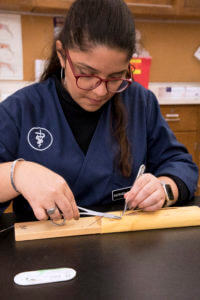
Rachaell Miranda, of the DVM Class of 2021, practices a simple interrupted suture pattern on a suture board.
The first three semesters of the curriculum include a series of small group, problem-based learning courses. Students work in small groups with a faculty tutor to study cases that help them to apply the basic science information that is being learned in other courses. Students learn how to find information in the literature and apply it to solve a problem, while also developing communication skills, teamwork skills and independent learning skills. The students’ problem-solving and communication skills will be evaluated through oral examinations.
The third year of the curriculum focuses on the diagnosis and treatment of diseases in a variety of species. Core third-year courses have been expanded to provide a strong foundation in medicine, surgery and diagnostics for all the major species. A new course on small animal primary care and wellness will increase the focus on primary care. A new Food Animal Medicine course will expand the students’ foundation in diseases of food and fiber animals. In addition, through a process of combining electives and incorporating some previously elective material into core courses, the total number of electives was reduced. In the new curriculum, students choose electives primarily in semester six to focus on specific career goals.
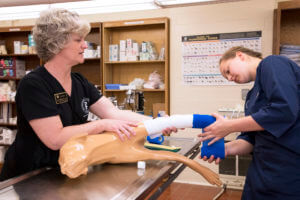
Guided by Clinical Skills Laboratory Manager Danielle Buchanan, Hannah Clinton, of the DVM Class of 2020, works on proper placement of a Modified Robert Jones bandage.
An important addition to the curriculum is a series of six courses called Veterinary Skills and Competencies (VSAC), which will occur each semester during the first three years. These courses are designed to promote the development of clinical skills, communication skills, business acumen, professionalism, and wellness skills. Students will have hands-on experience with animals throughout these courses. Instruction will occur through faculty-led laboratories, faculty-led discussion periods, online modules completed by independent study and through peer teaching. Students will be able to test out of some competencies by demonstrating proficiency and will then serve as peer instructors.
A unique feature of this part of the curriculum involves a newly created Clinical Skills Laboratory, where students will have multiple opportunities to practice skills so that they can truly achieve competency. An ardent supporter of this component of the new curriculum is Dr. Jim Weisman (PU DVM ’97), assistant dean for student affairs and clinical associate professor, who co-chaired with Dr. Wendy Townsend, associate professor ophthalmology, a faculty group that developed the VSAC course series. “Our College and in particular, our faculty, are committed to graduating students abundantly prepared to walk confidently into any career opportunity in the veterinary medical profession and work very productively from day one,” Dr. Weisman said. “As a complement to the VSAC courses, the Clinical Skills Laboratory is structured so that students can gain whatever additional mentoring and practice they need to fully master the skill sets needed in the fourth-year clinical setting. This puts them squarely on the path to great success upon graduation.”
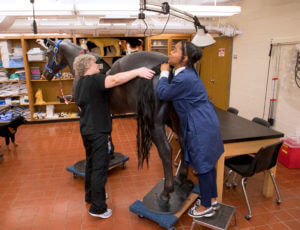
In the Clinical Skills Lab, students have the opportunity to practice skills applicable to both small and large animals. Zhané Brown, of the DVM Class of 2021, performs a rectal palpation on an equine model. Thanks to a recent educational grant the lab will soon have additional animal models on-hand to help students gain greater competency before reaching their final clinical year at Purdue.
After achieving competency in specific clinical skills, the third-year students will assist fourth-year DVM students in the Veterinary Teaching Hospital during evening and weekend shifts under the direction of veterinary technicians. The skills being learned and practiced in the VSAC courses will be integrated with foundational information covered in other courses.
The fourth year of the DVM curriculum will continue in its present format of a full year with 17 three-week clinical rotations. In this arrangement, each student chooses one of seven tracks in semester five. That choice then guides their selection of third-year elective courses and determines the required rotations in their fourth year. The tracks with the most focused content are Small Animal, Equine and Food Animal. The Large Animal track combines Equine and Food Animal. The Companion Animal track is a combination of Equine and Small Animal. The Mixed Animal track is the traditional broad-based experience involving both large and small animals. The Non-practice Track is designed for students in combined degree programs or pursuing research careers.
“I am so proud of our faculty for the amazing work they did to bring about this new curriculum, which puts our College solidly at the forefront of veterinary education,” said PVM Dean Willie Reed. “This curriculum builds on our College’s strong heritage of outstanding hands-on learning and real-world mentoring. With that solid foundation in place, our faculty utilized creativity and visionary thinking to enhance our program of study and set a new standard for educating veterinarians truly capable of both succeeding grandly in their careers, and boldly leading the profession forward to a brighter future.”

